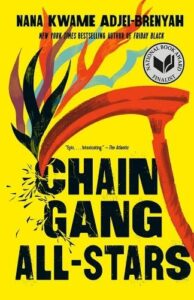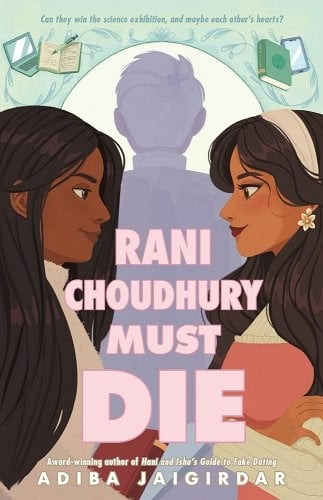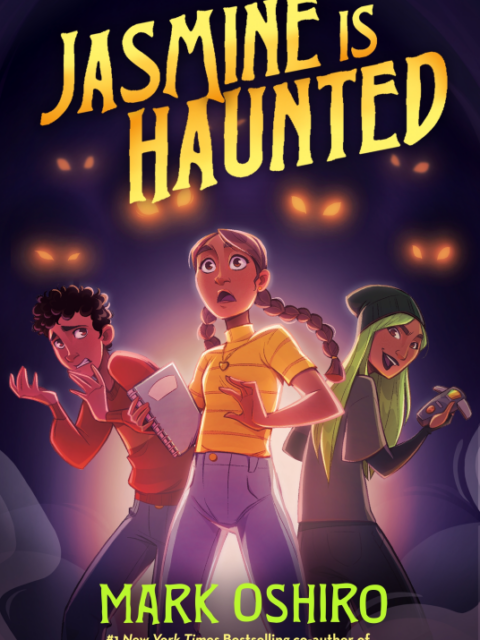Content warnings for pretty much everything: violence, gore, racism, incarceration, solitary confinement, self harm, cutting
At the time of writing this, it’s barely been three weeks since the 2024 presidential election in the United States, which Donald Trump won by a handy margin. Although Chain-Gang All-Stars by Nana Kwame Adjei-Brenyah came out over a year ago, it feels even more relevant right now, as I and millions of other Americans, especially queer and trans people and other marginalized groups, try to grapple with the fear and anger of a Trump re-election. There is also a layer of betrayal—that the country in which I have lived most of my life is populated mostly by people who willingly elected a hateful and bigoted man into office.
I have been learning this truth about the United States for as long as I have been learning about its history, but the nationalist myth America builds is strong, a fact unsurprising to anyone who has watched it begin to crumble. And yet every time I feel this sting of betrayal, I remember I have been insulated from its effects for so long because of my whiteness. People of color, and especially Black people, in the United States have not had the privilege of being shielded from this betrayal. Chain-Gang All-Stars might feel more poignant than ever right now, but it is shining light on a problem that had begun to fester long before Trump ever entered the political scene—one that has been inextricably bound up in American history since the very beginning.
This book combines the United States’ incredibly unjust carceral system with our sick fascination with violence into a Hunger Games-like arena-warfare dystopian satire. With the turn toward fascism happening in America, and being mirrored throughout the world, the idea behind Chain-Gang All-Stars isn’t altogether shocking. Not only is it unsurprising that the government would create a program where inmates could fight each other to the death in arenas as part of “hard action-sports,” but also that the people would allow this and, further, encourage it and revel in it as entertainment.
Adjei-Brenyah’s debut novel brings us into an entirely-too-believable world in which incarcerated people in the United States with long, life, or death sentences can opt to participate in the Chain-Gang All-Stars Battleground, a reality television show which pits inmates against one another in a fight to the death, with the promise of freedom for one who can survive three years. Our main characters are Loretta Thurwar and Hamara “Staxxx” Stacker, exceptional fighters who are haunted by their actions and lean on one another in a relationship that is as loving as it is gut-wrenching. Their queer romance (and its polyamorous inclusion of Staxxx’s other lover, Mac) is a sustaining force for both women as they navigate the unique hell that for-profit prisons have wrought. Their steadfast devotion to one another and the moments of relative peace they can find together are bits of hope in a deeply upsetting book.
Chain-Gang All-Stars might feel more poignant than ever right now, but it is shining light on a problem that had begun to fester long before Trump ever entered the political scene—one that has been inextricably bound up in American history since the very beginning.
There is a lot to be said about violent fantasy and our society’s thirst for blood and indifference towards the suffering we see on our screens, which Adjei-Brenyah brilliantly depicts in show-stopping prose. But the cruelty of the American carceral system and the way it exposes the rotting core at the center of a country often desperate to normalize its decay is at the center of the novel. Chain-Gang All-Stars is not content to sit comfortably in satire. It often connects the reader directly via footnotes to the real-life facts that sit just beneath the surface of a thin patina of satire. Various footnotes cite parts of the US Penal Code, statistics about the rate of incarceration of Black people, and the names of real people whose lives were unshakably altered by the prison system: Alfred Woodfox, Herman Wallace, Robert King, Cyntoia Brown, and many others. He cites the Thirteenth Amendment of the US Constitution, which states that “Neither slavery nor involuntary servitude, except as a punishment for crime whereof the party shall have been duly convicted, shall exist within the United States, or any place subject to their jurisdiction” (emphasis mine). And, of course, we can’t forget the very direct connection the title makes to the real history (and current-day instances) of “chain gangs” in the United States.
Adjei-Brenyah engages in the tough work of abolition philosophy, crafting a story that does not shy away from the questions of rehabilitation for violent crimes. Some of our main characters have committed heinous acts, which they grapple with throughout the novel, wondering if they truly deserve freedom at all as they continue to fight each other to the death. At its core, abolition is about hope—that rehabilitation is possible, that cruelty is cruelty no matter what, that all people are deserving of basic human dignity. Adjei-Brenyah writes, “I thought of how the world can be anything and how sad it is that it’s this,” a truth and also a fundamental hope that the world really can be anything, and it’s ours to shape.
Reading this book was incredibly difficult. It settles like a stone in your stomach that you will carry with you for the rest of your life. But reading it is also so necessary. Adjei-Brenyah does not let us forget the injustices that have happened and continue to happen in the US “justice” system every single day. The for-profit prison system in the US continues to enact its cruelty because it is less painful to pretend it is not happening, and the people getting rich because of it delight in its invisibility. Adjei-Brenyah renders it fully visible while also challenging the idea that visibility is everything. The world in this novel, so excruciatingly similar to our own, revels in the cruelty and turns it into entertainment. It feels like a cautionary tale—or perhaps it is simply Adjei-Brenyah holding up a mirror to our world and urging us to take a look.
Emilia Ferrante is a book-lover and poet living in Paris studying to get her Master’s degree. She is the co-host of Sapphink, a sapphic English-language book club, and loves crocheting, going on walks, and listening to the rain.




Leave a Reply